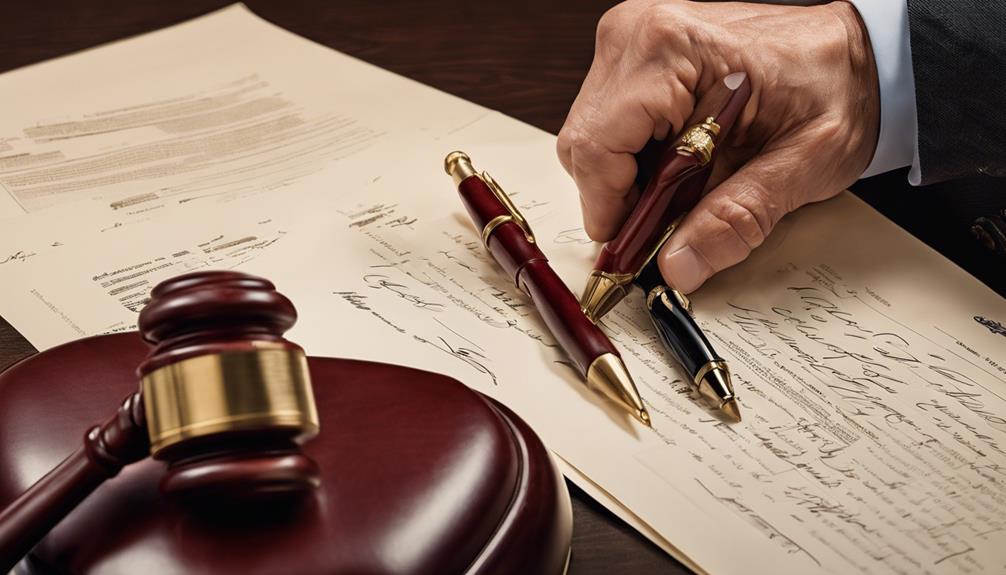Ladies and gentlemen, let’s start by focusing on a key aspect of legal matters – the significance of powers of attorney.
Ever wondered about the intricate web of authority that can be woven through this legal document? Well, hold tight as we unravel the complexities and unveil the nuances of powers of attorney that might just surprise you with their significance in various life scenarios.
Key Takeaways
- Agent must act in principal's best interest.
- Types: General vs. Limited Powers of Attorney.
- Legal requirements: Notary signature, clear agent authority.
- Revoking: Principal can end at any time, follow procedures carefully.
Definition and Purpose of Power of Attorney
Exploring the definition and purpose of a power of attorney provides a clear understanding of its role in legal and financial decision-making. A power of attorney is a crucial legal document that grants an agent the authority to act on behalf of a principal in various matters, especially when the principal is unable to do so themselves.
This document holds significant importance in financial and legal realms, as it ensures that decisions can be made on the principal's behalf if they become incapacitated. The agent, appointed by the principal, must adhere to the instructions outlined in the document and always act in the best interest of the principal.
Whether the power of attorney is general, providing broad authority, or limited to specific tasks, its primary goal remains to safeguard the principal's interests and ensure that someone trustworthy is designated to manage their affairs when needed. It serves as a proactive measure for planning ahead and establishing a reliable system for decision-making in times of need.
Types and Limitations of Power of Attorney

Understanding the different types and limitations of power of attorney is essential for grasping the extent of authority and restrictions that can be granted to an agent in legal and financial matters.
- General Power of Attorney: This grants broad rights to the agent to act on behalf of the principal in various matters.
- Limited Powers of Attorney: These grant specific rights for performing particular actions or transactions, focusing on specific tasks or transactions rather than broad authority like general powers.
- Termination: General Powers of Attorney can terminate based on specified time periods, tasks, death, incapacitation, or revocation.
- End-of-life Planning and Medical Directives: Powers of Attorney aren't ideal for these purposes, as they're more suited for business dealings or specific transactions rather than making decisions related to end-of-life planning or medical directives.
Understanding these distinctions can help individuals ensure they choose the appropriate type of power of attorney for their specific needs and circumstances.
Legal Requirements for Power of Attorney
To establish a legally valid power of attorney, it is essential for the document to be signed before a notary public. The principal must be 18 years or older and of sound mind when creating the power of attorney. Real estate transactions may have specific filing requirements to ensure the legality of the power of attorney involved. Within the power of attorney document, the agent's authority is clearly defined, outlining the scope of their responsibilities and decision-making powers.
| Legal Requirements for Power of Attorney | Details |
|---|---|
| Document Signing | Before a notary public |
| Principal Requirements | 18 years or older, of sound mind |
| Real Estate Transactions | Specific filing requirements |
| Agent's Authority | Clearly defined in the document |
| Third Parties Acceptance | Policies vary among different entities |
It is crucial to understand and adhere to these legal requirements to ensure that the power of attorney is valid and accepted by relevant third parties.
Choosing an Agent for Power of Attorney

When selecting an agent for a power of attorney, it's crucial to carefully assess their trustworthiness, reliability, and ability to act in your best interests. Here are some key considerations to keep in mind:
- Trustworthiness: Your agent should be someone you trust implicitly with important decisions regarding your finances and healthcare.
- Reliability: It's essential to choose an agent who's reliable and will consistently act in accordance with your wishes and instructions.
- Decision-making: The selected agent must possess the capability to make sound decisions on your behalf, especially when it comes to financial matters.
- Understanding your wishes: The agent should have a deep understanding of your preferences, values, and priorities to ensure they can represent your best interests effectively.
When deciding on an agent, whether it be a family member, friend, or professional advisor, ensure they meet these criteria and that you have open communication about your expectations and limitations before finalizing the power of attorney document.
Revoking and Ending Power of Attorney
After ensuring the trustworthiness and reliability of your chosen agent for power of attorney, the process of revoking and ending the power of attorney can be initiated by the principal at any time.
To properly revoke a power of attorney, the principal should use a sample revocation form and ensure all relevant parties are informed of the decision. Legal assistance may be necessary to ensure all legal requirements are met during the revocation process.
Detailed instructions on how to revoke a power of attorney, such as destroying the original document and providing a written revocation statement, are available for guidance.
Revoking a power of attorney ensures that the agent is no longer authorized to act on behalf of the principal. It's essential to follow the proper procedures to revoke a power of attorney to protect the interests of all involved parties and to prevent any unauthorized actions on behalf of the principal.
Frequently Asked Questions
What Three Decisions Cannot Be Made by a Legal Power of Attorney?
Three decisions a legal power of attorney can't make are related to:
- End-of-life care or medical treatment,
- Marriage or divorce matters, and
- The creation or modification of a will.
These limitations prevent powers of attorney from handling crucial aspects of an individual's personal and legal affairs. For instance, certain health decisions or personal preferences may require a more specialized directive, such as a healthcare proxy, which a power of attorney may not fully address. Additionally, actions involving potential medical risks, like neck cracking and arthritis risk, often fall outside the scope of routine legal authority, necessitating more specific medical oversight. This underscores the importance of understanding the breadth and limits of powers of attorney when planning for comprehensive personal care management.
It's essential for individuals to understand these restrictions when designating someone to act on their behalf in specific situations.
What Are the Risks of Being a Power of Attorney?
Being a power of attorney is like walking a tightrope; it carries significant responsibilities and risks. We must handle finances and decisions with care to avoid legal trouble or financial harm. Agents must always prioritize the principal's best interests, following their wishes diligently.
Misusing this power can result in severe consequences and losses. It's essential to keep precise records and act transparently to prevent conflicts or accusations of misconduct.
What Is One Important Thing for a Person With Power of Attorney to Know?
One important thing for us as individuals with power of attorney to know is that we must always act in the best interests of the principal. Understanding the authority granted in the document is crucial for making informed decisions.
Keeping detailed records of all transactions ensures accountability. Communication with the principal and others involved is key. Seeking legal advice for complex decisions helps us fulfill our duties effectively.
What Is the Most Powerful Power of Attorney?
The most powerful power of attorney is the Durable Power of Attorney. It grants extensive authority to the agent to handle the principal's financial and legal matters, even if the principal becomes incapacitated.
This type ensures continuity in decision-making during challenging times and is vital for long-term planning. It serves as a crucial tool to safeguard the principal's interests and assets in situations like illness or incapacity.
Conclusion
In conclusion, understanding the different types and legal requirements of powers of attorney is crucial for effective decision-making and protection of one's interests.
By choosing a trustworthy agent and ensuring proper execution, individuals can confidently navigate important legal matters.
Remember, whether it's a general, durable, or medical power of attorney, being informed and proactive in revoking or terminating the document when necessary ensures control and peace of mind.
Stay informed, stay empowered.










